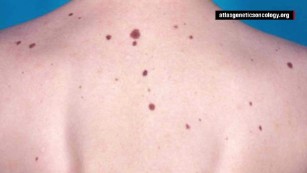How high is too high?
Dermatologists recommend using sunscreen to block the sun's ultraviolet rays. *Both* of the two types of UV rays can cause skin cancer. A UVA ray, the longer wave of the two, penetrates the skin deeply and is less likely to burn and show signs of overexposure. UVB rays are shorter and tend to damage the outer layer of the skin, causing sunburn. Both are linked to melanoma and other skin cancers. Most sunscreens sold today help protect against both.
The phrase "broad spectrum" signifies that a sunscreen offers some protection from UVA rays. The Sun Protection Factor (SPF) number is the level of protection a sunscreen provides against UVB rays, waves of light from the sun that are damaging to the outer surface of the skin.
Dr. Dawn Davis, a dermatologist at the Mayo Clinic who was not involved in the new reports, says SPF is a ratio of how long a person without sunscreen can be in the sun without experiencing any redness divided by the amount of time you can spend in sunlight with a product on.
In other words, "if you're standing on the equator at high noon and it would usually take your skin one minute without sunscreen to become red and irritated, SPF 15 means you can stand in that same sun exposure for 15 minutes."
But SPF 15 may not be enough for extended coverage. The American Academy of Dermatology recommends choosing a sunscreen that is at least SPF 30, which would block 97% of UVB rays.
So more is better, right? Not so fast, says Lunder. Several brands offer products with a high SPF, even over 100. But, she says, consumers are not getting the protection they think they are.
"People who buy high-SPF products are more likely to get burned because they assume they're getting better and longer-lasting protection," she said. Maximum protection comes when sunscreen is reapplied every few hours, and Lunder says people who buy these high-SPF products do not reapply often enough to have continuous skin protection. She recommends sticking to products between SPF 30 and 50.
---
73% of sunscreens don't work as advertised or contain "worrisome" ingredients, a report says.


沒有留言:
張貼留言